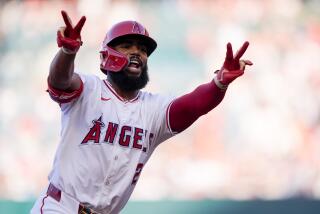His Salary Works Within System
- Share via
PEORIA, Ariz. — If Jorge Fabregas played in the NBA, he would be guaranteed $778,000 this season. If he played in the NFL, he would be guaranteed $650,000.
Those sports have salary caps, but they also have minimum salaries for veterans, along a scale based on years of experience. In baseball, Fabregas’ seven years of service guarantee him nothing beyond the same minimum wage that applies to rookies. The Angels signed their backup catcher for $500,000, plus incentives.
With increasing numbers of veterans subject to pay cuts and minor league contracts, and with the collective bargaining agreement up for negotiation, will the players’ union push for an agreement to raise minimum salaries for veterans?
“No,” union chief Donald Fehr said. “We’ve always believed the market ought to determine that.
“For example, if you said you’re going to have a veteran minimum at $600,000--I’m making up a number, it’s not a proposal--and the major league minimum is $200,000, and the [veteran] guy isn’t any more valuable than the other player, then you’re depriving him of the opportunity to take a job at $200,000. That seems to us to be a difficult thing to do.”
Neither the NFL nor NBA mandates that veterans fill a specified number of roster spots. But, so that teams do not keep a rookie rather than a veteran strictly for cost savings, both leagues subsidize the salaries of players with at least four years of service who are making the veteran minimum, which tops out at $1 million in the NBA and $750,000 in the NFL.
While a similar agreement might increase salaries for dozens of major league veterans, players say they might have to accept a salary cap in exchange, a concept they despise.
“This might hurt a couple guys, but for the most part our system gives you the opportunity to make more money,” Fabregas said. “It’s an open system. You go out on the free-agent market and see what you’re worth.”
*
Outfielder Tim Salmon, who unsuccessfully tried to play through shoulder and neck injuries last season, said he has asked Manager Mike Scioscia and batting coach Mickey Hatcher to be more forceful in determining when he might be too hurt to play.
So, when Salmon reported stiffness in his lower back Friday, Scioscia suggested he play it safe and take the day off. The two compromised--Salmon grounded out in the first inning, then left the game--and Salmon said he planned to play today.
“I have to,” he said. “I’ve got family coming to the game.”
Salmon says he feels healthy and strong this spring. He is hitting .333 in 15 at-bats, with six runs batted in.
“Now I’m basically using both hands to swing instead of one arm,” he said.
*
The Angels split Friday, beating the San Diego Padres, 8-6, at Peoria and losing to the Colorado Rockies, 14-1, at Tucson. In the victory, Troy Glaus hit his first home run of the spring, and Troy Percival struck out the side in his one inning.... The Angels will send Nathan Haynes to Southern California to consult with Dr. Norman Zemel, a hand specialist, about the thumb injury Haynes suffered Wednesday. If Zemel recommends surgery to repair the damaged ligament, Scioscia said Haynes could miss “half the season.” Haynes, the only outfielder on Baseball America’s list of the top 10 Angel prospects, was scheduled to play center field at triple-A Salt Lake.
More to Read
Go beyond the scoreboard
Get the latest on L.A.'s teams in the daily Sports Report newsletter.
You may occasionally receive promotional content from the Los Angeles Times.







